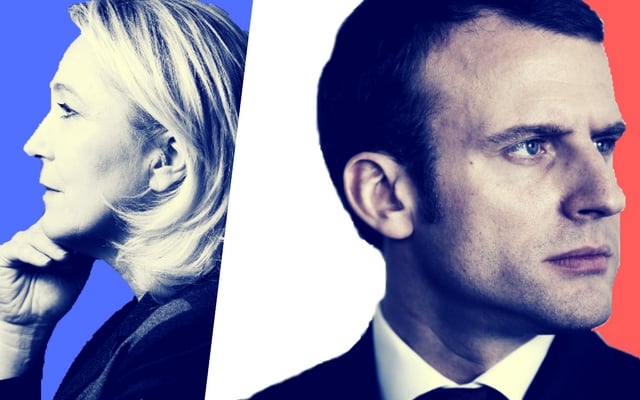Polling day follows an unprecedented campaign marked by scandal, repeated surprises and a last-minute hacking attack on Macron, a 39-year-old who has never held elected office.
The run-off vote pits the pro-Europe, pro-business Macron against anti-immigration and anti-EU Le Pen, two radically different visions that underline a split in Western democracies.
Le Pen, 48, has portrayed the ballot as a contest between the “globalists” represented by her rival — those in favour of open trade, immigration and shared sovereignty — versus the “nationalists” who defend strong borders and national identities.
Voting began at 8am French time in 66,546 polling stations. Most will close at 7pm, except those in big cities which will stay open an hour longer.
Voter turnout at noon was measured at under 30 percent, less than the previous two elections at the same time, said the Interior Ministry.
Voter turnout at noon is 28.23%, compared to 30.66% in 2012 and 34.11% in 2007. #Presidentielle2017 pic.twitter.com/MqPLQuihEa
— The Local France (@TheLocalFrance) May 7, 2017
A first estimate of the results will be published around 8pm.
“The political choice the French people are going to make is clear,” Le Pen said in her opening remarks during an often vicious debate between the pair on Wednesday night.
Le Pen voted in the northern town of Henin-Beaumont where she was greeted by members of feminist group Femen who unfurled an anti-Le Pen banner.

The last polling showed Macron — winner of last month's election first round — with a widening lead of around 62 percent to 38 percent before the hacking revelations on Friday evening. A campaigning blackout entered into force shortly after.
Hundreds of thousands of emails and documents stolen from the Macron campaign were dumped online and then spread by anti-secrecy group WikiLeaks, leading the candidate to call it an attempt at “democratic destabilisation.”
France's election authority said publishing the documents could be a criminal offence, a warning heeded by traditional media organizations but flouted by Macron's opponents and far-right activists online.
“We knew that there were these risks during the presidential campaign because it happened elsewhere. Nothing will go without a response,” French President Francois Hollande told AFP on Saturday.
Winds of change
US intelligence agencies believe state-backed Russian operatives were behind a massive hacking attack on Democratic candidate Hillary Clinton's campaign ahead of America's presidential election last November.
There has been no claim of responsibility for the French hack, but the government and Macron's team previously accused the Kremlin of trying to meddle in the election — accusations denied in Moscow.
Whoever wins Sunday's vote it is set to cause profound change for France, the world's sixth-biggest economy, a permanent member of the UN security council and a global military power.
It is the first time neither of the country's traditional parties has a candidate in the final round of the presidential election under the modern French republic, founded in 1958.
Macron would be France's youngest-ever leader and was a virtual unknown three years ago when he was named economy minister, the launchpad for his sensational presidential bid.
He left Hollande's Socialist government in August and formed En Marche (On the Move), a political movement he says is neither of the left nor the right and which has attracted 250,000 members.
The ex-investment banker's programme pledges to cut state spending, ease labour laws, boost education in deprived areas and extend new protections to the self-employed.
He is also fervently pro-European and wants to re-energise the 28-member European Union, following Britain's referendum vote last summer to leave.
“France is not a closed country. We are in Europe and in the world,” Macron said during Wednesday's debate.
But Le Pen is hoping to spring a shock that would resonate as widely as Britain's decision to withdraw from the EU or the unexpected triumph of US President Donald Trump.
First round winners
National Front leader Le Pen sees herself as part of the same backlash against globalisation that has emerged as a powerful theme in the US and in recent ballots in Britain, Austria and the Netherlands.
She has pledged to organise a referendum on withdrawing France from the EU and wants to scrap the euro, which she has dubbed a “currency of bankers.”
She has also vowed to reduce net immigration to 10,000 people a year, crack down on outsourcing by multinationals, lower the retirement age and introduce hardline measures to tackle Islamic extremists.
Many voters still see her party as anti-Semitic and racist despite her six-year drive to improve its image.
Macron topped the first round of the presidential election on April 23 with 24.01 percent, followed by Le Pen on 21.30 percent, in a crowded field of 11 candidates.
The results revealed Macron was favoured among wealthier, better educated citizens in cities, while Le Pen drew support in the countryside as well as poverty-hit areas in the south and rustbelt northeast.
Voting for the run-off started for French voters in north America and some overseas territories on Saturday.




 Please whitelist us to continue reading.
Please whitelist us to continue reading.